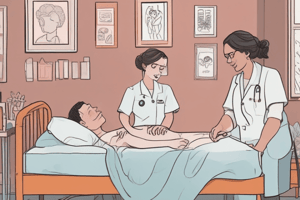Podcast
Questions and Answers
Which nursing care topic involves developing treatment plans and educating patients on pain management strategies?
Which nursing care topic involves developing treatment plans and educating patients on pain management strategies?
- Wound Care
- Pain Management (correct)
- Assessment
- Medication Management
Which nursing care topic focuses on providing comfort and support to patients and their families during terminal illness or end-of-life care?
Which nursing care topic focuses on providing comfort and support to patients and their families during terminal illness or end-of-life care?
- Palliative Care (correct)
- Infection Control
- Wound Care
- Medication Management
What is a primary function of nurses in medication management?
What is a primary function of nurses in medication management?
- Monitoring wound healing
- Developing individualized care plans
- Administering medications and monitoring their effects (correct)
- Performing physical examinations
Which nursing care topic involves gathering information through observation, interview, and physical examination to identify health needs?
Which nursing care topic involves gathering information through observation, interview, and physical examination to identify health needs?
What is the main focus of nurses in wound care?
What is the main focus of nurses in wound care?
What is the primary focus of nurses when providing cardiovascular care to patients?
What is the primary focus of nurses when providing cardiovascular care to patients?
In what aspect of patient care do nurses play a crucial role in promoting safe and healthy workplaces?
In what aspect of patient care do nurses play a crucial role in promoting safe and healthy workplaces?
What is a key responsibility of nurses in the field of Health Informatics?
What is a key responsibility of nurses in the field of Health Informatics?
Which area of patient care involves nurses helping individuals manage endocrine disorders like diabetes?
Which area of patient care involves nurses helping individuals manage endocrine disorders like diabetes?
What distinguishes the role of nurses in Emergency Care from their role in Mental Health?
What distinguishes the role of nurses in Emergency Care from their role in Mental Health?
Flashcards are hidden until you start studying
Study Notes
Nursing Care: A Comprehensive Overview
When it comes to providing care for patients, nurses are at the forefront, offering compassionate, knowledgeable, and skilled support. Their role extends beyond basic medical care, encompassing a wide range of topics to ensure the well-being, comfort, and recovery of individuals across diverse health conditions.
Nursing Care Topics
-
Assessment: Nurses gather information through observation, interview, and physical examination to identify health needs and develop an individualized care plan.
-
Medication Management: Nurses are trained to administer medications, monitor their effects, and ensure patients understand their medication regimens.
-
Wound Care: Nurses clean, dress, and monitor wounds to promote healing and prevent infection.
-
Pain Management: Nurses assess pain levels, develop treatment plans, and educate patients on pain management strategies.
-
Palliative Care: Nurses provide comfort and support to patients and their families during terminal illness or end-of-life care, focusing on symptom management and emotional well-being.
-
Infection Control: Nurses implement infection prevention practices to minimize the risk of hospital-acquired infections and keep patients healthy.
-
Patient Education: Nurses educate patients on disease management, medication usage, and preventive measures to promote self-care and improve health outcomes.
-
Health Promotion: Nurses educate patients about healthy lifestyles, healthy habits, and disease prevention measures to reduce the risk of illness and improve overall health.
-
Mental Health: Nurses assess and address patients' emotional needs, offering support and guidance during periods of stress, anxiety, or depression.
-
Cardiovascular Care: Nurses assist patients with heart conditions, providing education, monitoring, and support to help manage their health.
-
Respiratory Care: Nurses help manage respiratory conditions, providing education, monitoring, and support to help patients breathe more easily.
-
Endocrinology: Nurses monitor and manage patients with endocrine disorders, such as diabetes, providing education and support to help them manage their health.
-
Emergency Care: Nurses respond quickly to emergency situations, performing assessments, providing immediate care, and initiating treatment to stabilize patients.
-
Rehabilitation: Nurses assist patients who are recovering from illness or injury, helping them regain function and independence.
-
Aged Care: Nurses care for elderly patients, helping them maintain their independence, safety, and comfort while addressing their unique health needs.
-
Transcultural Care: Nurses respect and accommodate cultural differences in patient care, ensuring that patients receive care that is tailored to their unique needs and beliefs.
-
Environmental and Occupational Health: Nurses promote safe and healthy workplaces, addressing occupational hazards and encouraging healthy habits to prevent illness and injury.
-
Health Informatics: Nurses use technology and data management to improve patient care, ensuring that patient information is accurate, up-to-date, and accessible to other healthcare providers.
These topics reflect the diverse skills and knowledge necessary to provide comprehensive, holistic care to patients. Nurses are essential partners in the healthcare team, working together with doctors, pharmacists, physical therapists, and other professionals to promote health and well-being across a wide range of conditions.
Through ongoing education, specialized training, and collaboration with other healthcare professionals, nurses continue to evolve their practice, ensuring that patients receive the highest quality care possible. Their dedication, compassion, and expertise make a lasting impact on the lives of those they serve, helping patients to recover, heal, and thrive.
Studying That Suits You
Use AI to generate personalized quizzes and flashcards to suit your learning preferences.




